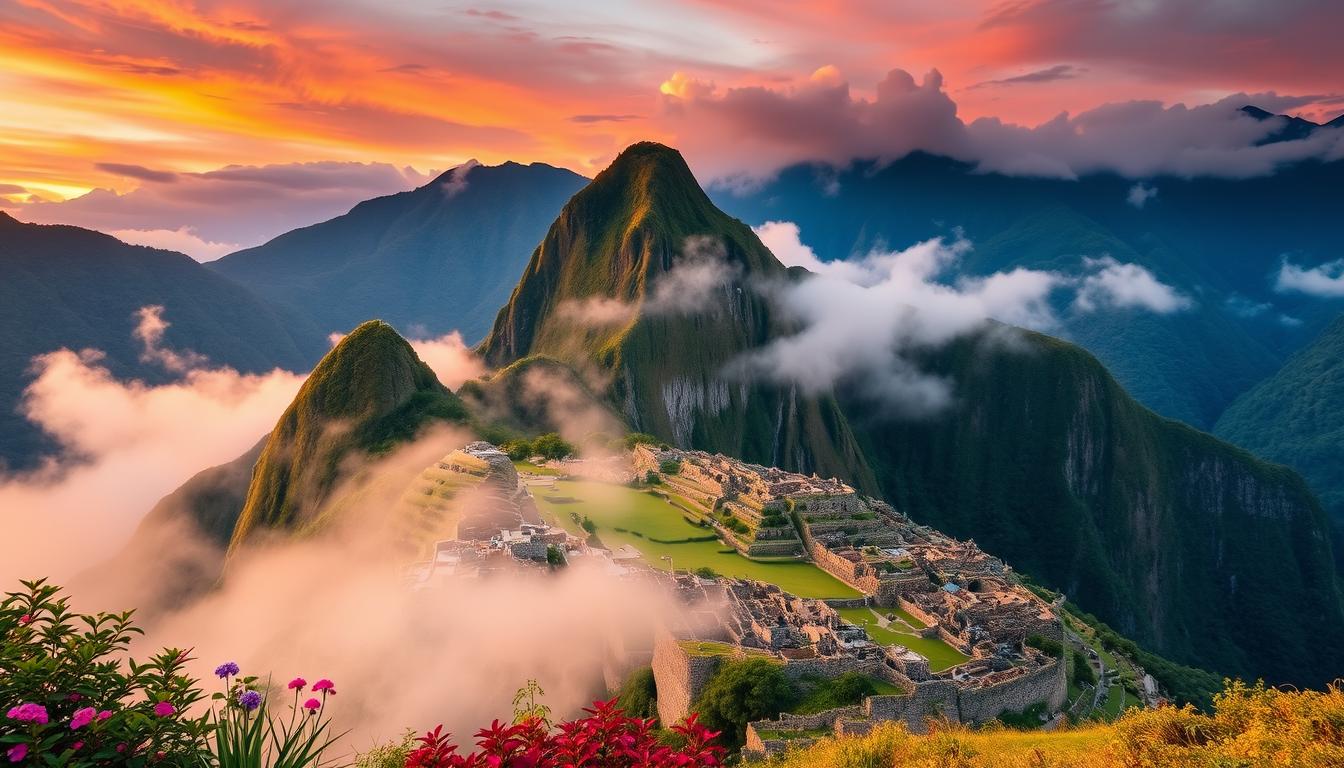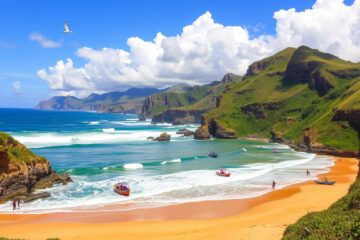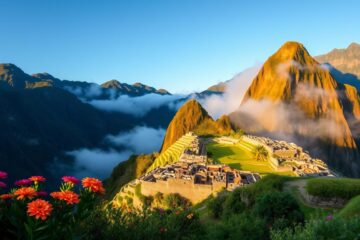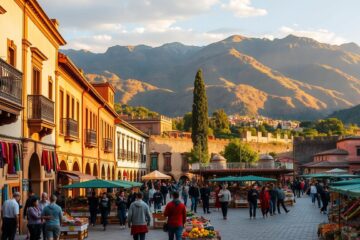Peru is a mix of ancient ruins, lively cities, and stunning nature. It’s a top spot for travelers in 2025. You can see the famous Inca ruins of Machu Picchu or try Lima’s food. Peru has something for everyone, from the Andes mountains to the Amazon rainforest.
It’s perfect for those who love nature and culture. Peru is also good for the planet, thanks to its green tourism.
Key Takeaways
- Discover the ancient mysteries of Machu Picchu, one of the most iconic archaeological sites in the world.
- Explore the vibrant cities of Peru, from the culinary capital of Lima to the historic charm of Cusco.
- Immerse yourself in the country’s diverse cultural experiences, from traditional festivals to vibrant local markets.
- Venture into the breathtaking natural wonders, including the Nazca Lines, the Colca Canyon, and the stunning Amazon rainforest.
- Indulge in Peru’s renowned cuisine, a fusion of indigenous and international flavors.
Explore the Wonders of Machu Picchu
Machu Picchu, the famous “lost city” of the Incas, is a UNESCO World Heritage site. It’s known for its stunning ruins and beautiful mountains. This ancient place, found in 1911, lets visitors explore the Inca history and culture. A Machu Picchu tour is an experience you won’t forget.
The History Behind the Lost City
Machu Picchu started in the 15th century, when the Inca Empire was strong. It was a secret place in the Andes Mountains, maybe for the Inca rulers. Forgotten for years, it was found again in 1911 by Hiram Bingham. He was amazed by its structures and the natural beauty around it.
Best Hiking Trails to Take
- The classic Inca Trail is a four-day trek to the Sun Gate. It offers a stunning view of Machu Picchu. This hike lets you see many Inca ruins.
- The One-Day Inca Trail starts at km 104 from Ollantaytambo. It’s a 15-kilometer (9-mile) hike to Machu Picchu. It’s great for those with less time.
- The Machu Picchu Mountain hike is tough but rewarding. It gives you amazing views of the site and the mountains.
Tips for Visiting
Here are some tips for visiting Machu Picchu:
- Book your Machu Picchu tours and Inca trail trekking passes early. They sell out fast, even more so during peak season.
- Get to Machu Picchu early to avoid crowds. It’s quieter and more peaceful in the morning.
- Consider staying in Aguas Calientes overnight. It’s a more relaxed way to experience the area.
- Get your Wayna Picchu hike pass early. There are only a few spots available.
“Machu Picchu is a place that inspires wonder and awe. Standing amidst the ruins, you can’t help but be captivated by the ingenuity and resilience of the Inca civilization.”
Discover the Sacred Valley
The Sacred Valley of the Incas is a stunning area between the Andes mountains. It shows Peru’s rich culture. This valley, called the “breadbasket of the Incas,” has many Sacred Valley tours and Peruvian cultural experiences. These draw visitors from all over.
Top Attractions in the Valley
The Pisac Archaeological Site is a top spot. It’s famous for its Inca ruins and markets on Sundays and Thursdays. Ollantaytambo is another must-see, with its Inca stone fortresses.
Don’t miss the salt evaporation ponds of Maras. Here, families have been making salt for generations. Also, see the terraces of Moray, thought to be an Inca farm.
Cultural Experiences You Can’t Miss
- Experience the Andean community of Misminay. Learn about Inca farming and join in traditional activities.
- Go to the Sunday market in Chinchero. It’s less crowded and offers local produce, crafts, and views.
- Stay at the Sacred Valley’s luxury resorts. They offer a peaceful place to relax.
The Sacred Valley is known for its beauty, culture, and activities. It’s perfect for those looking for Sacred Valley tours or wanting to explore Peruvian cultural experiences. It’s a memorable part of any trip to Peru.
Experience the Vibrant City of Cusco
Cusco, once the Inca Empire’s capital, mixes ancient history with colonial architecture and modern comforts. It’s a top spot for sightseeing, with historical sites, lively markets, and unique shops. These places show off the best of Peruvian culture.
Must-See Historical Sites
See the city’s rich past at places like Qorikancha, the Inca sun temple, and Sacsayhuaman, a massive complex with great views. These sites give a peek into the Inca Empire’s greatness and Cusco’s lasting impact.
Local Markets and Shopping
Experience the lively vibe of Cusco’s Peruvian markets, like San Pedro Market. Walk through stalls filled with exotic fruits, local crafts, and traditional foods. Don’t miss the Plaza de Armas, surrounded by colonial buildings and churches, for shopping and admiring the city’s architecture.
Cusco is a great starting point for exploring nearby sights and getting used to the high altitude. Before heading to Machu Picchu or other Andean spots, Cusco offers a unique and unforgettable journey.
“Cusco is a city that captivates the senses, where the past and present seamlessly intertwine, inviting travelers to discover the essence of Peruvian culture and heritage.”
Indulge in Peruvian Cuisine
Peruvian food is now famous worldwide, with Lima’s Central restaurant named the best. This South American country mixes many flavors, thanks to its history. You’ll find dishes that blend indigenous, Spanish, African, Chinese, and Japanese tastes.
Signature Dishes to Try
- Ceviche – A fresh fish dish marinated in lime juice, onions, chili peppers, and cilantro. It’s a zesty and refreshing treat.
- Lomo Saltado – A mix of Chinese stir-fry and Peruvian ingredients. It’s a savory dish with beef, onions, tomatoes, and French fries.
- Aji de Gallina – A creamy chicken stew with aji amarillo. This gives it a mild heat and bright color.
- Anticuchos – Skewered and grilled meats, a nod to Incan traditions. It’s a flavorful street food.
Best Restaurants in Peru
Peru’s varied landscapes and rich food history have led to a vibrant restaurant scene. In Lima, Central and Maido stand out. They use local ingredients in creative ways, offering a journey through Peru’s natural wonders.
| Restaurant | Cuisine | Ranking |
|---|---|---|
| Central | Peruvian | World’s Best Restaurant 2023 |
| Maido | Nikkei (Peruvian-Japanese fusion) | No. 2 in Latin America’s 50 Best Restaurants 2023 |
Peru’s food scene is full of options, from traditional spots to modern fusion places. It’s a great place to explore Peruvian cuisine.
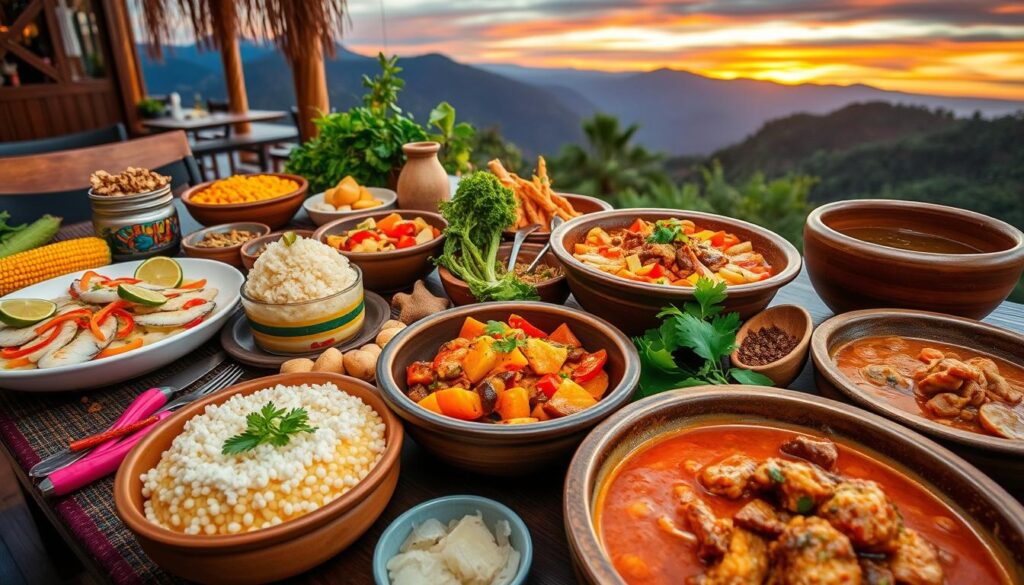
“Peruvian cuisine is a symphony of flavors, drawing inspiration from the country’s diverse ecosystems and centuries-old culinary traditions.” – Chef Virgilio Martínez, owner of Central restaurant
Visit the Nazca Lines
The Nazca Lines are in the Peruvian desert. They have amazed people for centuries. These ancient designs, made between 500 BC and 500 AD, show animals, plants, and shapes. Seeing them from above, via a Nazca Lines flights, is the best way to understand their size and detail.
How to Get There
The city of Nazca is about 250 miles south of Lima. You can get there by bus or car. The Nazca Lines are huge, covering 175 square miles. Flights leave from a small airstrip near the city.
They start as early as 7 am. This is when the wind and visibility are best. Morning is the best time to see them clearly.
Understanding Their Significance
The ancient Peruvian geoglyphs of the Nazca Lines are fascinating. They were made by the Nazca culture. These giant designs were probably for astronomy and ceremonies.
Some think they might have been for aliens. But, they show the creativity and skill of ancient Peruvian people.
“The Nazca Lines are one of the most important archeological sites in Peru, alongside Machu Picchu and Chan Chan.”
Flights over the Nazca Lines cost $70 to $100 for 30 minutes. Companies like AeroParacas offer this amazing experience. Remember to bring your passport. It’s needed for the flight.
Take a Journey to Lake Titicaca
Lake Titicaca sits high in the Andes, on the Peru-Bolivia border. It’s the world’s highest navigable lake, at 12,500 feet. Here, visitors can see floating islands and meet the Uros people, who live as they have for centuries.
Activities on the Lake
Kayaking on Lake Titicaca is peaceful and beautiful. You’ll see reeds and wildlife. For a luxury trip, take the Titicaca train from Cusco to Puno. It offers stunning views.
Unique Cultural Insights
There’s more to Lake Titicaca than its beauty. Taquile Island is famous for its textiles. It’s a UNESCO site where men and women weave together.
Staying with local families on islands like Amantani is special. You’ll learn about Andean life and the lake’s role in Inca myths.
Visiting Lake Titicaca is an adventure. You’ll see stunning views and learn about local traditions. It’s a trip you won’t forget.
| Fact | Value |
|---|---|
| Elevation | 12,500 ft (3,810 m) |
| Puno City Population | Approximately 130,000 |
| Dry Season | April to November |
| Rainy Season | December to March |
| Peak Travel Season | June, July, August |
| Taquile Island Textile Art | Declared an Intangible Heritage of Humanity by UNESCO in 2005 |
| Amantani Island Population | Around 4,000 residents |
| Suasi Island | The only privately-owned island in Lake Titicaca |
Exploring Lake Titicaca excursions and Peruvian island communities is unforgettable. It’s a deep dive into Peru’s culture.
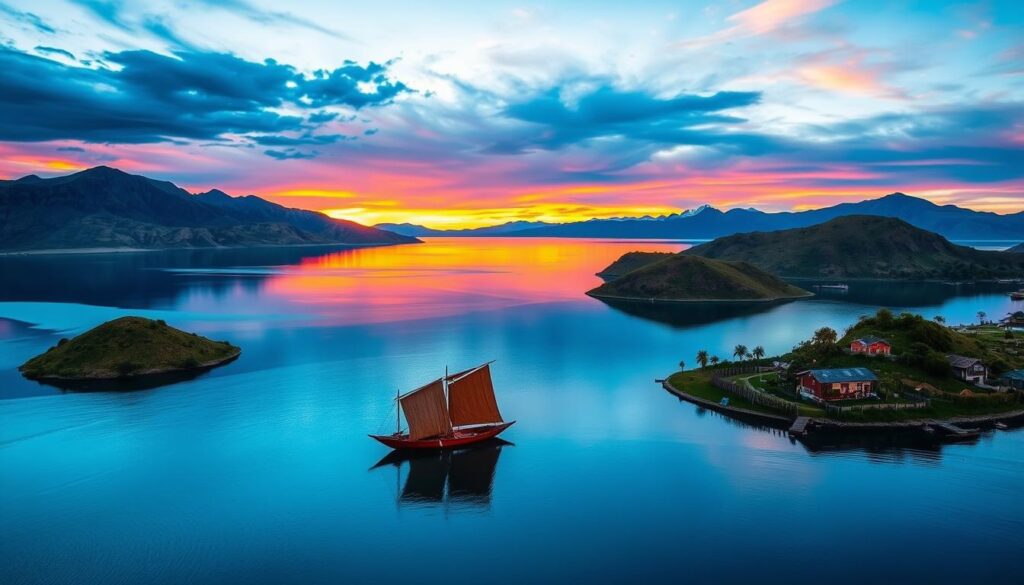
“Lake Titicaca is a magical place where time seems to stand still, and the ancient traditions of the Andean people come alive.”
Experience the Amazon Rainforest
Step into the heart of Peru’s Amazon rainforest, a place teeming with life. Manu National Park, a UNESCO World Heritage site, is the most biodiverse place on Earth. It offers endless opportunities for those who love nature and adventure. Explore the Amazon through guided tours and stay at Peruvian jungle lodges that are good for the environment.
Adventure Tours Available
There are many exciting tours in the Amazon. You can walk on the forest canopy or go on a night hike. These activities let you see colorful birds, playful monkeys, and maybe even a jaguar.
Boat trips on the rivers give a unique view of the Amazon. Visiting local communities also offers a glimpse into traditional life.
Wildlife Spotting Tips
- Look for animal tracks, nests, and feeding signs to find wildlife.
- Watch for movement in the trees for monkeys, birds, and sloths.
- Be quiet and still to avoid scaring animals.
- Go on a night hike to see caimans and frogs.
For a deeper experience, stay longer to explore more and help with conservation. Discover the Amazon’s wonders and make unforgettable memories of your Peruvian jungle adventure.
| Statistic | Value |
|---|---|
| Visitors who see a jaguar at Tambopata Research Center | 1 in 3 |
| Flight duration from Lima to Puerto Maldonado | Less than 2 hours |
| Recommended arrival time in Puerto Maldonado | Before 12:30 pm |
| Bus ride duration from Puerto Maldonado to Tambopata River | 1 hour |
| Boat ride duration on Tambopata River to Tambopata Research Center | 2.5 hours |
| Boat capacity | 16-18 people |
| Provisions during boat ride | Prepackaged lunch and juice |
| Walk duration from river dock to Tambopata Research Center lodge | 5 minutes |
| Typical arrival time at Tambopata Research Center | 3:30-4 pm |
| Luggage weight restriction per person | 15 kg (33 pounds) |
Explore the Colca Canyon
The Colca Canyon is a natural wonder in the Andes Mountains of southern Peru. It is known for its stunning landscapes and unique wildlife. As one of the world’s deepest canyons, it offers hikers and nature lovers an unforgettable adventure.
Best Views and Hiking Trails
The Colca Canyon is famous for its incredible viewpoints. These offer panoramic views of towering cliffs and lush vegetation. The Cruz del Condor is a famous spot where visitors can see Andean condors soaring.
Hiking trails here range from easy day walks to challenging multi-day treks. Travelers can explore pre-Inca terraces, natural hot springs, and hidden waterfalls.
Local Villages to Visit
- Chivay: This charming town is the gateway to the Colca Canyon. It offers insights into the region’s rich culture and traditions. Visitors can stroll through local markets, visit the colonial-era Nuestra Señora de la Asunción church, and soak in the therapeutic waters of the nearby Calera thermal baths.
- Yanque and Maca: These traditional villages showcase the architectural and cultural heritage of the Colca region. They have well-preserved colonial churches and vibrant community life.
- Cabanaconde: This picturesque town is the starting point for many Colca Canyon treks. It provides access to the stunning Oasis of Sangalle, a lush, oasis-like area at the bottom of the canyon.
Exploring the Colca Canyon is a must for any traveler. It offers a true wilderness experience combined with cultural immersion. From Andean condor sightings to beautiful hiking trails and traditional villages, this region of Peru is unforgettable.
Discover the Coastal City of Lima
Lima, the vibrant capital of Peru, is a mix of colonial history and modern life. It’s a top spot for Lima city tours and exploring its many attractions. These are key activities for anyone visiting the area.
Historic Sites to Experience
The historic center of Lima is a UNESCO World Heritage site. It’s filled with colonial architecture that’s well-preserved. You can see the beautiful Plaza de Armas, the grand Lima Cathedral, and the San Francisco Monastery with its spooky catacombs.
Museums like the Museo Larco show Peru’s rich pre-Columbian art and artifacts. They help you understand Peru’s cultural heritage better.
Food Tours in the Capital
Trying Lima’s famous food is a must. Food tours let you taste Peruvian dishes like ceviche and lomo saltado. You’ll also visit local markets and fancy restaurants to see Lima’s culinary side.
Lima has history, art, and amazing food. It’s a city that promises a memorable trip to Peru. Plan your Lima city tours and dive into the Peruvian capital’s attractions.
“Lima is a city that offers a perfect blend of history, culture, and cuisine. It’s a must-visit destination for any traveler to Peru.” – John Doe, travel writer
Enjoy the Party Scene in Arequipa
Arequipa is known as the “White City” for its unique architecture. It has a lively nightlife and festival scene. You can find everything from bars and clubs to traditional music and dance. The city is perfect for those wanting to dive into the Arequipa nightlife and Peruvian festivals.
Nightlife Hotspots
The city’s historical center is a UNESCO World Heritage site. It comes alive at night with spots like Calle San Francisco and Cayma district. You can check out Déjà Vu, Casona Forum, and Siwara for live music, dance, and more.
Local Festivals
Arequipa celebrates many festivals throughout the year. The Fiestas del Cusco in June and the Virgen de Chapi pilgrimage in May are highlights. The Santa Catalina Monastery offers nighttime tours, giving a peek into the city’s past.
Looking to dance, enjoy local music, or dive into cultural celebrations? Arequipa’s party scene has it all for travelers.
| Nightlife Hotspot | Unique Feature |
|---|---|
| Museo Del Pisco | Offers 100 varieties of Pisco drinks |
| Déjà Vu | Transforms into a popular club at night, close to Iglesia San Francisco |
| Casona Forum | Known as the best place to experience Arequipa’s nightlife |
| Siwara | Located in front of the Santa Catalina Monastery, a beer tavern with two patios |
| Brujas Bar | Has a nordic-style atmosphere |
“Arequipa’s nightlife is vibrant from Thursday to Saturday. It’s filled with bars, restaurants, and dance clubs for locals and visitors.”
Immerse Yourself in Peruvian Culture
Peru’s culture is rich and diverse, seen in its many festivals and artistic traditions. The Inti Raymi, or Festival of the Sun, is a colorful Inca ceremony in Cusco. It attracts thousands of people every year. In Puno, the Virgen de la Candelaria festival is known for its vibrant costumes and folk dances.
Traditional Festivals and Celebrations
Visitors can hear the enchanting sounds of Andean music, with instruments like the charango and quena. Peru’s art scene includes pre-Columbian ceramics and modern street art in Lima’s Barranco district. The Sacred Valley is famous for its textile traditions, where you can learn about ancient weaving and natural dyes.
Art and Music You’ll Love
Joining a local cooking class or visiting a traditional market gives you a peek into Peru’s culinary culture. From the Inti Raymi festival to the Andean art and music, Peruvian cultural immersion is unforgettable. Discover the Andean art and music to truly appreciate this South American gem.
